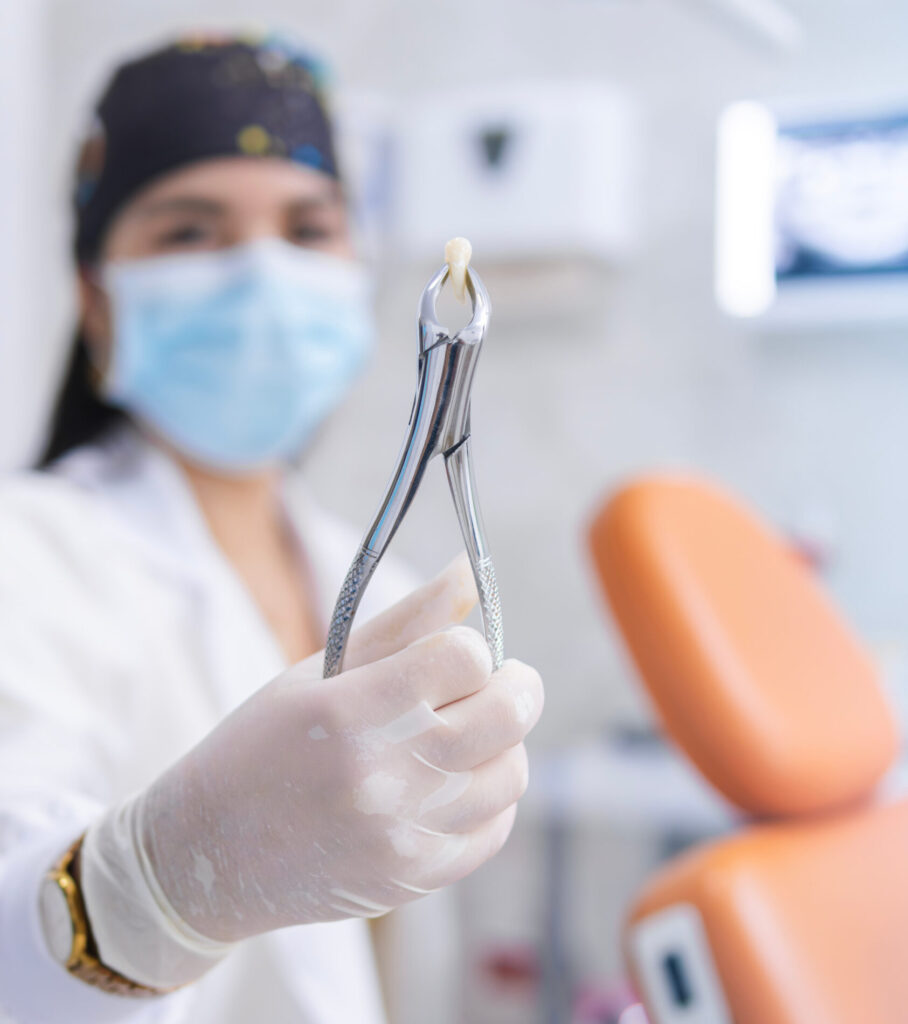
Tooth extraction is often a last resort when other treatments can’t save a damaged or diseased tooth. While modern dentistry focuses on preserving your natural teeth whenever possible, certain situations make extraction the most appropriate treatment option. Understanding the warning signs can help you seek timely care and potentially save you from more complex complications down the road.
At Dental Group of Chicago, our team prioritizes general dentistry treatments that preserve your natural smile. However, when extraction becomes necessary, we guide you through the process with compassion and ensure you understand all your options for tooth replacement. Our experienced team is available Monday through Friday from 8 AM to 8 PM, plus Saturday appointments for your convenience.
Severe Tooth Decay and Damage
Advanced tooth decay is one of the most common reasons for extraction. When decay reaches deep into the tooth’s pulp, it can cause severe infection and pain. If the damage is too extensive for a root canal treatment to be successful, extraction may be able to prevent the spread of infection to surrounding tissues.
Teeth with large fractures or breaks that extend below the gum line often can’t be repaired with crowns or other restorative treatments. These situations typically occur after trauma, accidents, or from biting down on something hard. When the structural integrity of the tooth is compromised beyond repair, extraction becomes the most viable option.
Physical trauma from sports injuries, falls, or accidents can also damage teeth beyond repair. Even if a tooth looks intact on the surface, internal damage to the roots or surrounding bone may make extraction necessary. X-rays and other diagnostic tools help your dentist assess the full extent of the damage.
Advanced Gum Disease
Periodontal disease affects the tissues and bone that support your teeth. In its early stages, gingivitis causes gum inflammation and bleeding, but advanced periodontitis can destroy the structures that hold your teeth in place. According to the American Dental Association, chronic periodontitis affects 47.2% of adults over 30 in the United States and can lead to the loss of tissue and bone that support the teeth.
When gum disease progresses to the point where teeth become loose or the supporting bone is severely damaged, extraction may be necessary. Teeth that are loose due to periodontal disease often can’t be saved, even with intensive treatment. Early intervention through periodontal care can often prevent the need for extractions.
Signs of advanced gum disease include persistent bad breath, loose teeth, receding gums, and deep pockets between the teeth and gums. If you notice these symptoms, seeking professional evaluation quickly becomes important for preserving as many teeth as possible.
Overcrowding and Orthodontic Needs
Sometimes healthy teeth need to be removed to create space for proper tooth alignment. Orthodontic treatment may require extractions when there isn’t enough room in your mouth for all your teeth to fit properly. This situation commonly occurs with wisdom teeth, which often don’t have adequate space to erupt correctly.
Wisdom teeth, also called third molars, frequently require extraction because most people’s mouths don’t have room for these additional teeth. When wisdom teeth try to emerge without sufficient space, they can become impacted, causing pain, swelling, and potential damage to adjacent teeth.
Other teeth may need extraction before orthodontic treatment if severe crowding exists. Your orthodontist will work closely with your general dentist to determine if extractions are necessary for achieving optimal results with braces or Invisalign treatment.
Impacted Teeth
Impacted teeth occur when a tooth can’t emerge properly through the gum line due to a lack of space or abnormal positioning. While wisdom teeth are most commonly impacted, other teeth can also become stuck beneath the gum line or grow in at incorrect angles.
Impacted teeth can cause several problems, including pain, swelling, infection, and damage to neighboring teeth. Food and bacteria can become trapped around partially erupted teeth, leading to decay and gum disease. In many cases, extracting impacted teeth prevents these

Infection and Abscesses
When bacteria enters the pulp of a tooth through decay, periodontal disease, or a cracked tooth, it can cause a serious tooth infection called an abscess. While root canal treatment can often resolve these infections, some cases are too severe or complex for the tooth to be saved.
Abscesses cause intense throbbing pain, swelling, fever, and sensitivity to hot and cold. If the infection spreads to surrounding tissues or into the bloodstream, it can become life-threatening. In severe cases where the infection can’t be controlled through root canal therapy and antibiotics, extraction may be necessary to eliminate the source of infection.
Signs of a serious tooth infection include severe, persistent pain, facial swelling, swollen lymph nodes, fever, and a bad taste in your mouth. If you experience these symptoms, seeking immediate emergency dental care becomes crucial.
When Other Treatments Aren’t Viable
Sometimes teeth that might otherwise be saveable need extraction due to other health factors or treatment limitations. Patients undergoing certain medical treatments, such as radiation therapy or chemotherapy, may need problematic teeth removed before treatment begins to prevent complications.
Certain medications can affect your body’s ability to fight infection or heal properly, making some dental procedures less predictable. In these situations, extraction might be recommended to prevent potential complications during or after medical treatment.
Economic factors also sometimes play a role in treatment decisions. While dentists always present the most conservative treatment options first, some patients may choose extraction over more expensive treatments like root canals and crowns, especially for back teeth that are less visible.
Professional Evaluation at Dental Group of Chicago
If you’re experiencing tooth pain, swelling, or any of the symptoms mentioned above, don’t wait to seek professional evaluation. Early intervention can often prevent the need for extraction through treatments like fillings, crowns, or root canal therapy. However, when extraction is necessary, our experienced team ensures the procedure is as comfortable as possible and discusses all your options for tooth replacement.
We accept a wide variety of insurance plans, including Delta Dental, MetLife, Cigna, BlueCross BlueShield, Guardian, and United Healthcare, making quality dental care accessible to patients throughout the greater Chicagoland area. Our commitment to patient accessibility means we’re here when you need us most. Call us at (312) 588-0043 or contact us online to schedule your consultation today.

